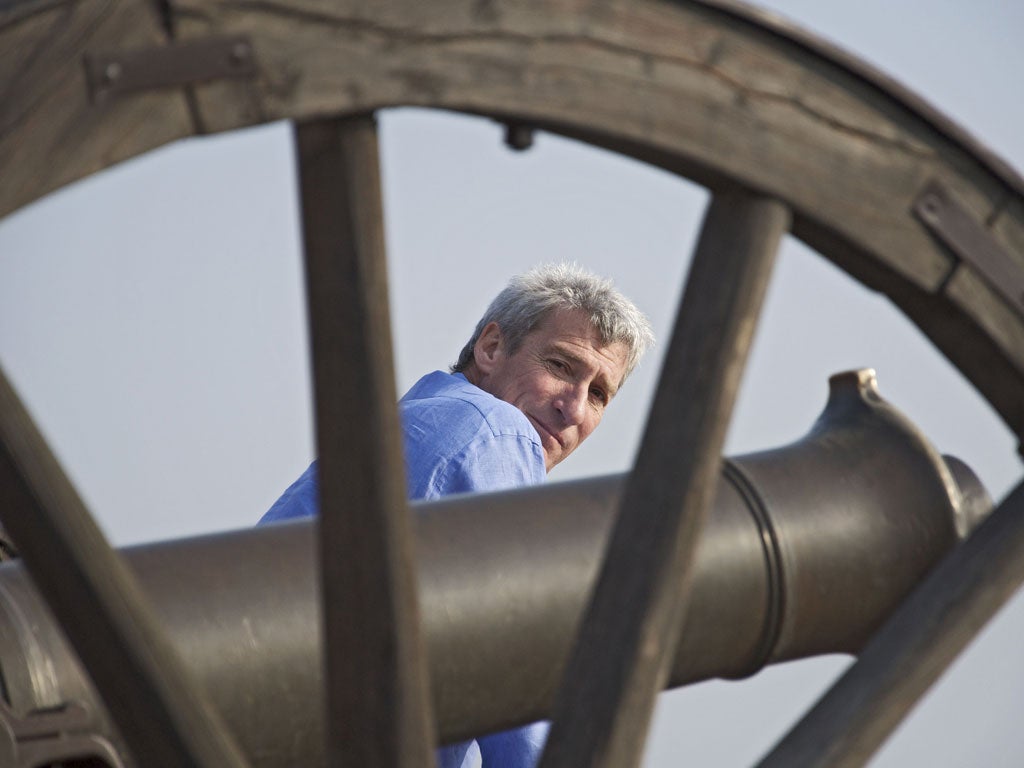Empire, BBC1, Monday Make Bradford British, Channel 4, Thursday
Unlike Britain's colonisers, Jeremy Paxman had no one to bully in a history tour that looked as if it were a lot more fun for him than for us

Confidence tricks, protection rackets and rulers who favoured "advice that had to be taken" over direct orders ... there were times during the first episode of Jeremy Paxman's latest TV project when it felt as if you were watching The Godfather rather than a series on the building of the British Empire.
The clue was in the titles, a single monolithic word in brick-clad block caps that signalled this was the BBC in big-budget mode. All hail Empire, presented by the no-nonsense Paxman, peppered with sexy gangster language and lavishly produced with full orchestral backing. This, you couldn't fail to note, was serious television on a serious subject.
So it was something of a surprise that episode one, "A Taste for Power", picked up the story from an arbitrary mid-point and then tiptoed around in what felt like a desperate bid not to upset anyone at the Daily Mail. No luck there. A week after Paxman was being hailed a hero for accusing the BBC of being "too PC", Empire had failed to celebrate the Brits' "civilising" successes heartily enough and was being derided in that publication as "cartoon propaganda". Paxo's crime? To see things from both sides (he described the Indian Rebellion of 1857 as "the first war of independence and the Indian mutiny", and so on).
By the time he had slipped from India to Cairo to deliver his sermon on the importance of the Suez Canal, Paxman's suitability as the presenter of such an "important" piece of programming had to be called into question. Where were the people he could ruthlessly interrogate? Whither the talking heads he could harangue with a timely "Have to hurry you."? And most importantly, what makes an incisive journalist think he can bring history to life simply by travelling to the places where history happened and opine without any of the shabby likeability associated with the history tutor.
As he stood barefoot tracing world maps in some exotic sand or other, it quickly became clear that Paxman was enjoying delivering his lectures rather more than we were going to enjoy receiving them. "How did such a small country get such a big head?" had been his opening gambit. And though he never made much of an attempt at any kind of explanation, you get the feeling that Paxman of all people knows the answer already.
There was another, not altogether unconnected question at the root of Make Bradford British: what does it mean to be British today? The attempt to find an answer took the form of a social experiment conducted by the "diversity and community experts Laurie Trott and Taiba Yasseen". Eight residents of one of Britain's most racially divided cities would live together to see if seeds of harmony could be sown from ground tilled with tolerance and understanding.
If the original Big Brother was documentary masquerading as reality TV, Make Bradford British was that trick reversed. And while it's always fun – as the likes of Wife Swap have proved – to put opposites together, if this was supposed to be a learning experience for participants and audience, then the only conclusion to be drawn was that we could all do with getting out of our ghettos more often.
If we did, we too might feel the depth of emotion experienced by the 66-year-old former magistrate, Maura, upon witnessing the quiet intensity and dignity of Rashid at prayer. If we did, we might not be quite as gob-smacked to hear Jens, a 71-year-old retired police officer, reminiscing fondly about the good old days when one could joke about "Paki-bashing".
"There was a time when Britannia really did rule the waves," Paxman bellowed from the deck of a frigate. And, in the end, both Empire and Bradford amounted to little more than exercises in televisual naval-gazing.
Subscribe to Independent Premium to bookmark this article
Want to bookmark your favourite articles and stories to read or reference later? Start your Independent Premium subscription today.

Join our commenting forum
Join thought-provoking conversations, follow other Independent readers and see their replies